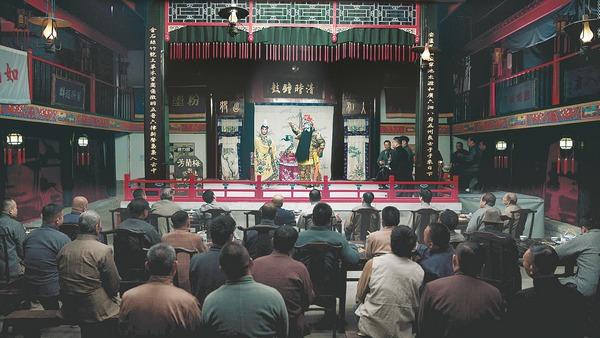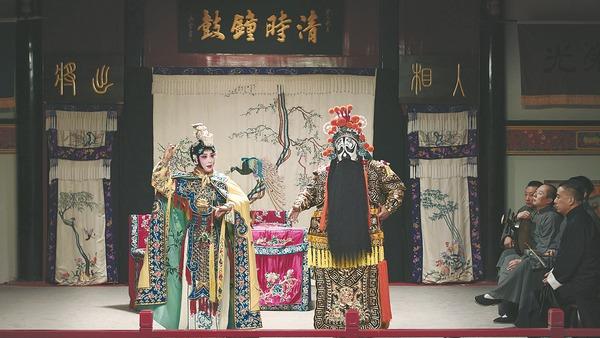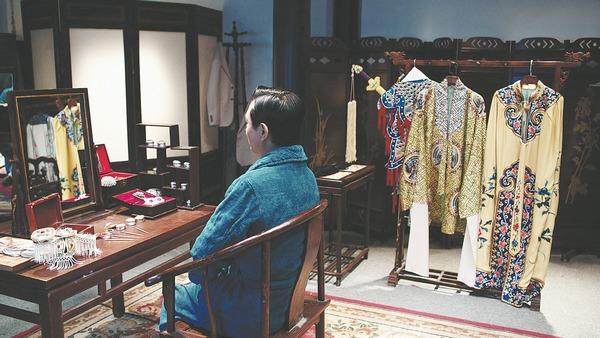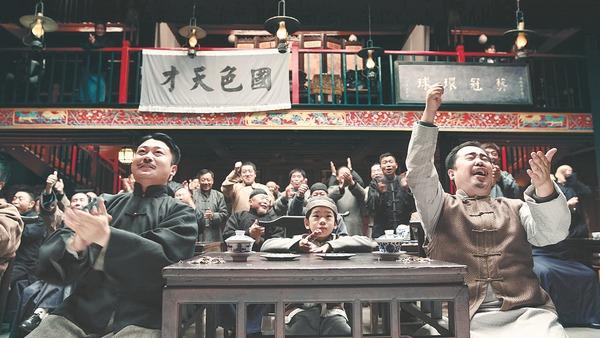 The CCTV movie showcases the beauty of classic Peking Opera, as well as Mei Lanfang's artistic achievements. The successful premiere of his "Farewell My Concubine" is brought back to life with vivid presentation of the show and offstage stories. (PHOTO / CHINA DAILY)
The CCTV movie showcases the beauty of classic Peking Opera, as well as Mei Lanfang's artistic achievements. The successful premiere of his "Farewell My Concubine" is brought back to life with vivid presentation of the show and offstage stories. (PHOTO / CHINA DAILY)
CCTV airs new program on Mei Lanfang and other Peking Opera greats, Chen Nan reports.
Imagine a 100-year-old performance: while music is thick in the air and filled with loud gongs, cymbals and drums, a star appears onstage, the audience clapping and cheering throughout the night.
These scenes were typical of performances by Peking Opera master Mei Lanfang (1894-1961) while he was playing his signature roles such as Yuji in Farewell My Concubine.
A 30-minute movie was produced last year by China Central Television to mark the 100th anniversary of Mei's premiere of Farewell My Concubine, a classic Peking Opera piece. On Feb 15, it was screened on CCTV-11, the State broadcaster's traditional Chinese opera channel, as the first episode of its new program, titled Encountering the Past.
Nearly 20 professional Peking Opera performers are featured in the movie, showcasing the beauty of classic Peking Opera, as well as portraying Mei's life.
ALSO READ: Classic Peking Opera work to grace the silver screen
On Feb 15, 1922, Mei premiered his rendition of Farewell My Concubine, which was an instant success. Along with Peking Opera master Yang Xiaolou, Mei performed in a theater in the Qianmen area of Beijing.
"Though the theater is no longer there, Mei's Farewell My Concubine has become his signature work and the piece has been performed by students of Mei in subsequent generations," says 90-year-old Niu Biao, a veteran Peking Opera performer who is also a scholar of the ancient art form.
 The CCTV movie showcases the beauty of classic Peking Opera, as well as Mei Lanfang's artistic achievements. The successful premiere of his "Farewell My Concubine" is brought back to life with vivid presentation of the show and offstage stories. (PHOTO / CHINA DAILY)
The CCTV movie showcases the beauty of classic Peking Opera, as well as Mei Lanfang's artistic achievements. The successful premiere of his "Farewell My Concubine" is brought back to life with vivid presentation of the show and offstage stories. (PHOTO / CHINA DAILY)
Historic premiere
Peking Opera combines singing, dancing, acrobatics and martial arts. The art form is two centuries old, passed down from one generation to the next largely through master-student training, with trainees learning the basic skills through oral instruction, observation and imitation.
I watched the piece when I was a child. The characters were vivid and well-presented by the actors. It's a typical story of Peking Opera about love, loyalty and bravery.
Niu Biao, Peking Opera actor
Mei was one of the best-known nandan, which refers to a man playing a female role, a practice that dates from a period when women were forbidden to take to the stage.
Farewell My Concubine follows the story of the war between the states of Chu and Han in the third century BC. Xiang Yu, the King of Western Chu, is brave but lacks tactics, as well as being stubborn and arrogant. Regardless of objections from his generals and his favorite concubine, Yuji, he sends troops to fight against Han. As a result, he and his army are ambushed and trapped.
READ MORE: A star that still shines
Aware of the fact that he is doomed, Xiang Yu intends to break out of the encirclement with his beloved Yuji. However, rather than weighing down the army, she chooses to commit suicide with a sword after a feast and a sword dance. Xiang Yu is defeated and retreats. Too ashamed to return home, he kills himself by slitting his throat with his sword.
In 1918, Farewell My Concubine was first performed by Yang and Shang Xiaoyun, also a famous nandan, in Beijing. When Mei told Yang that he wanted to adapt the piece, Yang agreed and supported him.
Mei's adaptation narrowed it down from a four-night-long performance to two nights. According to Niu, on the first day of the premiere of Farewell My Concubine, Yang told Mei that he was exhausted because there were too many martial arts scenes. After finishing the performance, Mei decided to narrow it further to one night.
"I watched the piece when I was a child. The characters were vivid and well-presented by the actors. It's a typical story of Peking Opera about love, loyalty and bravery," adds Niu.
Qian Hao, the director of the movie, says that the 100th anniversary of the premiere of Mei's Farewell My Concubine deserves to be celebrated.
READ MORE: Remastering a maestro
He and his team went through the archived recordings at the channel and found an original recording by Mei and Peking Opera master Liu Lianrong, performing Farewell My Concubine in Tianjin in 1951. They repaired the old tape, which is about 20 minutes long, and used eight minutes in the movie.
 The CCTV movie showcases the beauty of classic Peking Opera, as well as Mei Lanfang's artistic achievements. The successful premiere of his "Farewell My Concubine" is brought back to life with vivid presentation of the show and offstage stories. (PHOTO / CHINA DAILY)
The CCTV movie showcases the beauty of classic Peking Opera, as well as Mei Lanfang's artistic achievements. The successful premiere of his "Farewell My Concubine" is brought back to life with vivid presentation of the show and offstage stories. (PHOTO / CHINA DAILY)
Memories resurrected
The CCTV movie is set against the backdrop of the late 1920s at the height of Mei's career — his shows were sold out, and he was the biggest star in China.
The story follows one night when he was performing Farewell My Concubine before the outbreak of the War of Resistance Against Japanese Aggression (1931-45).
It was a regular night, but Mei faced pressure because he refused to perform for the Japanese troops. After the experience, he decided to move to Hong Kong, leaving in 1938 and withdrawing from theater for years until the war ended.
ALSO READ: Striking a chord
"Mei was not only an outstanding Peking Opera master, but an admirable patriot. We showcased his art and his values to the audience today," says Qian, adding that the movie was shot in Anhui Huiguan, an old theater in Beijing for Peking Opera shows first built during the Qing Dynasty (1644-1911).
Peking Opera actor Liu Zheng plays the role of Mei offstage, and Peking Opera actress Zhang Xinyue plays the role of Mei when he transforms into Yuji onstage.
 The CCTV movie showcases the beauty of classic Peking Opera, as well as Mei Lanfang's artistic achievements. The successful premiere of his "Farewell My Concubine" is brought back to life with vivid presentation of the show and offstage stories. (PHOTO / CHINA DAILY)
The CCTV movie showcases the beauty of classic Peking Opera, as well as Mei Lanfang's artistic achievements. The successful premiere of his "Farewell My Concubine" is brought back to life with vivid presentation of the show and offstage stories. (PHOTO / CHINA DAILY)
Zhang was trained by Mei Baojiu (1934-2016), Mei Lanfang's son and also a famous nandan performer.
"Farewell My Concubine was the first piece I learned with Mei Baojiu. I can still remember him showing me the movements of the sword dance, a famous part of the show, in the former residence of Mei Lanfang in Beijing. It was a small courtyard, and I practiced the dance over and over again," recalls Zhang, who started to learn Mei-style performance when she was 17.
Now, Zhang works with the Jingju Theater Co of Beijing. This year, the company will launch a series of classic shows by Mei Lanfang to mark the 130th anniversary of his birth in 2024.
In the movie, 83-year-old Peking Opera actor Li Changchun plays the role of Xiang Yu. According to Qian, it has been eight years since Li performed onstage.
 The CCTV movie showcases the beauty of classic Peking Opera, as well as Mei Lanfang's artistic achievements. The successful premiere of his "Farewell My Concubine" is brought back to life with vivid presentation of the show and offstage stories. (PHOTO / CHINA DAILY)
The CCTV movie showcases the beauty of classic Peking Opera, as well as Mei Lanfang's artistic achievements. The successful premiere of his "Farewell My Concubine" is brought back to life with vivid presentation of the show and offstage stories. (PHOTO / CHINA DAILY)
To attract a bigger audience, especially those who are not Peking Opera fans, Qian's team invited actor Li Guangfu, a fan of Peking Opera, to play the role of the theater's boss.
The new TV program, Encountering the Past, follows on a popular program, Classic Collections, which showcased refurbished footage of traditional Chinese opera masters.
"With Encountering the Past, we will repair and bring these old audio materials to life. We plan to produce 10 episodes in the first season," says Qian.
Contact the writer at chennan@chinadaily.com.cn


